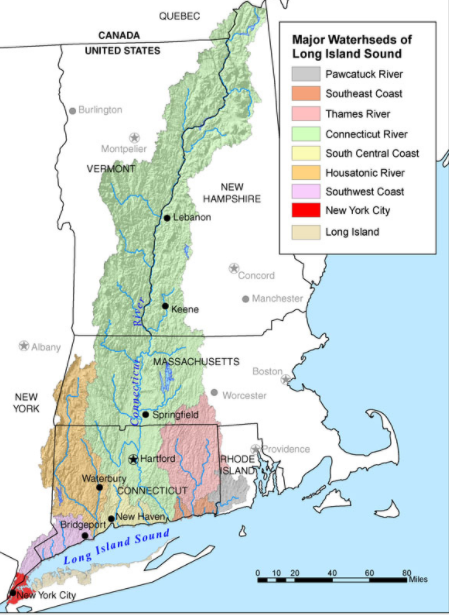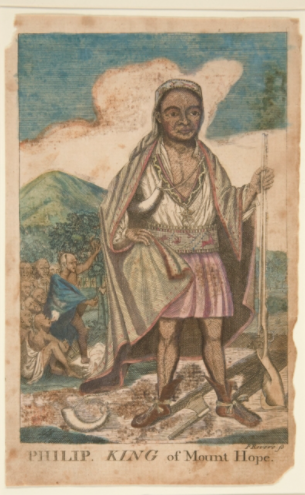edited by Antoinette Louie

On the morrow2 morning we must go over the river, i.e. Connecticut3, to meet with King Phillip. Two canoes4 full they had carried over; the next turn I myself was to go. But as my foot was upon the canoe to step in there was as sudden outcry among them, and I must go step back, and instead of going over the river, I must go four or five miles up the river farther northward. Some of the Indians ran one way, and some another. The cause of this rout was, as I thought, their espying some English scouts, who were thereabout. In this travel up the river about noon the company made a stop, and sat down; some to eat, and others to rest them. As I sat amongst them, musing of things past, my son Joseph5 unexpectedly came to me. We asked each other’s welfare, bemoaning6 our doleful condition, and the change that had come upon us. We had husband and father, and children, and sisters, and friends, and relations, and house, and home, and many comforts of this life: but now we may say, as Job,7, “Naked came I out of my mother’s womb, and naked shall I return: the Lord gave, the Lord hath taken away, blessed be the name of the Lord.” I asked him whether he would read. He told me he earnestly desired it, I gave him my Bible, and he lightened upon that comfortable Scripture “I shall not die but live, and declare the works of the Lord: the Lord hath chastened me sore yet he hath not given me over to death” 8 (Psalm 118.17-18). “Look here, mother,” says he, “did you read this?” And here I may take occasion to mention one principal ground of my setting forth theses lines: even as the psalmist says, to declare the works of the Lord, and His wonderful power carrying us along again, preserving us in the wilderness, while under the enemy’s hand, and returning of us in safety again. And His goodness in bringing to my hand so many comfortable and suitable scriptures in my distress. But to return, we traveled on till night; and in the morning, we must go over the river to Phillips crew. When I saw in the canoe I could not but be amazed at the numerous crew of pagans, that were on the bank on the other side. When I came ashore, they gathered all about me, I sitting alone in the midst. I observed they asked one another questions, and laughed, and rejoiced over their gains and victories. Then my heart began to fail: and I fell aweeping, which was the first time to my rembembrance, that I wept before them. Although I had met with so much affliction, and my heart was many times ready to break, yet could I not shed one tear in their sight; but rather had been all this while in a maze, and like one astonished. But now I may say as Psalm 137.1, “By the Rivers of Babylon, there we sate down: yea, we wept when we remembered Zion.”9 There one of them asked me why I wept. I could hardly tell what to say: Yet I answered they would kill me. “No,” said he, “none will hurt you.” Then came one of them and gave me two spoonfuls of meal to comfort me, and another gave me half a pint of peas; which was more worth than many bushles at another time. Then I went to see King Phillip. He bade me come in and sit down, and asked me whether I would smoke it (a usual compliment nowadays amongst saints and sinners) but this no way suited me. For though I had formerly used tobacco, yet I had left it ever since I was first taken. It seems to be a bait the devil lays to make men lose their precious time. I remember with shame how formerly, when I had taken two or three pipes, I was presently ready for another, such a bewitching thing it is. But I thank God, He has now given me power over it; surely there are many who may be better employed than to lie suckling a stinking tobacco-pipe10
Thanks to Project Gutenberg and archive.org for providing the digitized versions of Rowlandson’s text free of charge. Without their generosity, this project would not be possible.
Metacom-leader of the Wampanoag Indians- he requested an english name when he was elected chief of the Wampanoag Indians ↩
morrow is a poetic literary term used since the 12th century ↩
https://www.americanrivers.org/river/connecticut-river/. Certain Native American groups migrated in certain areas during the King Phillip War. ↩
http://www.birchbarkcanoe.net/birchbarkcanoes.htm. Canoes had been the a source of mobility for the Naive Americans that migrated to certain locations. ↩
Mary’s son who had been sent to another tribe when they were captured by the Native Americans, but they had made contact after a few weeks and were allowed to visit each other. ↩
https://www.google.com/search?q=bemoaning&oq=bemoaning&aqs=chrome..69i57j0i433j0i67i131i433i457j0i67l3j0l2.1332j0j15&sourceid=chrome&ie=UTF-8#dobs=doleful ↩
https://www.biblegateway.com/quicksearch/?quicksearch=Naked+came+I+out+of+my+mother%27s+womb%2C+and+naked+shall+I+return&version=GNV. Mary had the bible called Geneva Bilble of 1599 : which was her source of comfort due to being captured by Native Americans. ↩
https://www.biblegateway.com/quicksearch/?quicksearch=we+wept+when+we+remembered+zion&version=GNV. Words of encouragement to be grateful to be alive and continue to have faith in the words of the bible. ↩
https://biblehub.com/bsb-strongs/psalms/137.htm ↩
https://accessgenealogy.com/native/use-tobacco-among-north-american-indians.htm. Which was a form of showing respect for Indians during this era ↩

